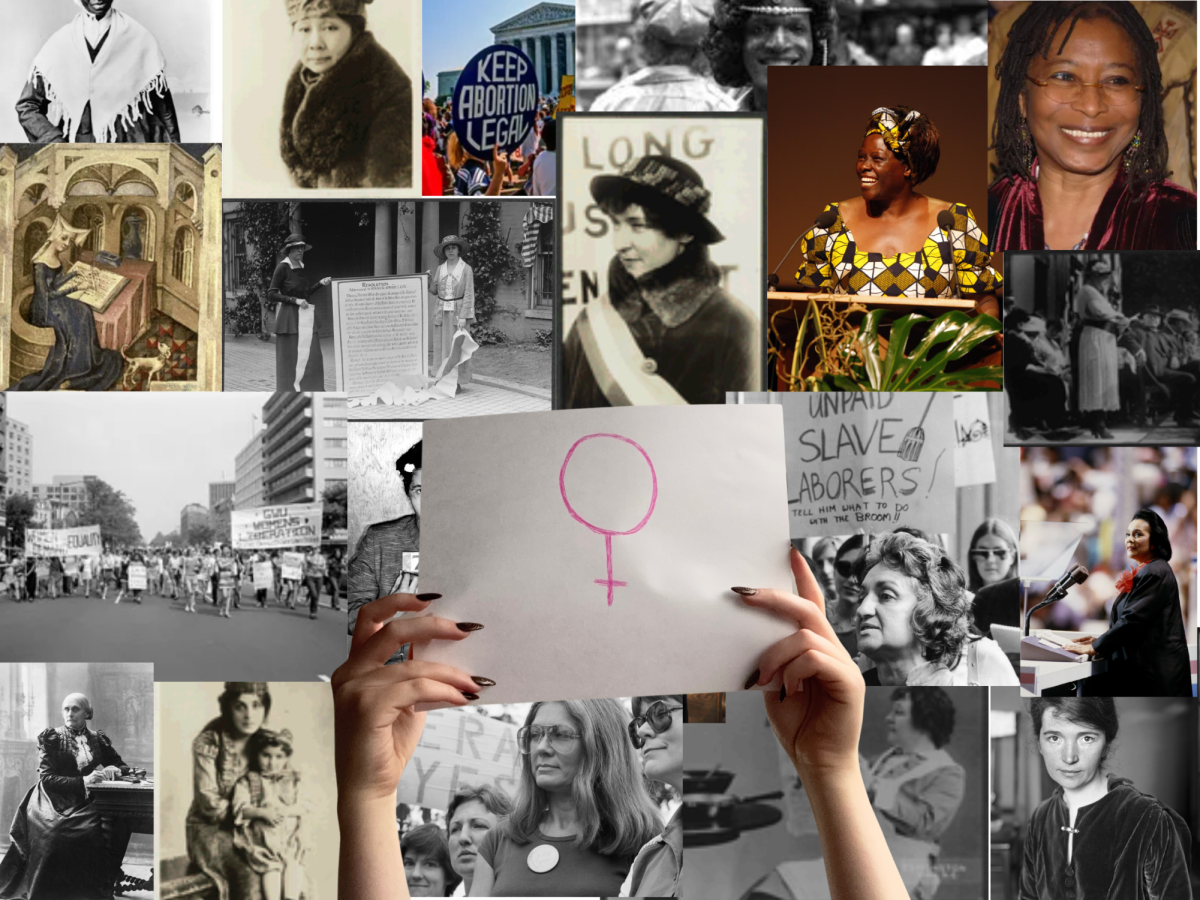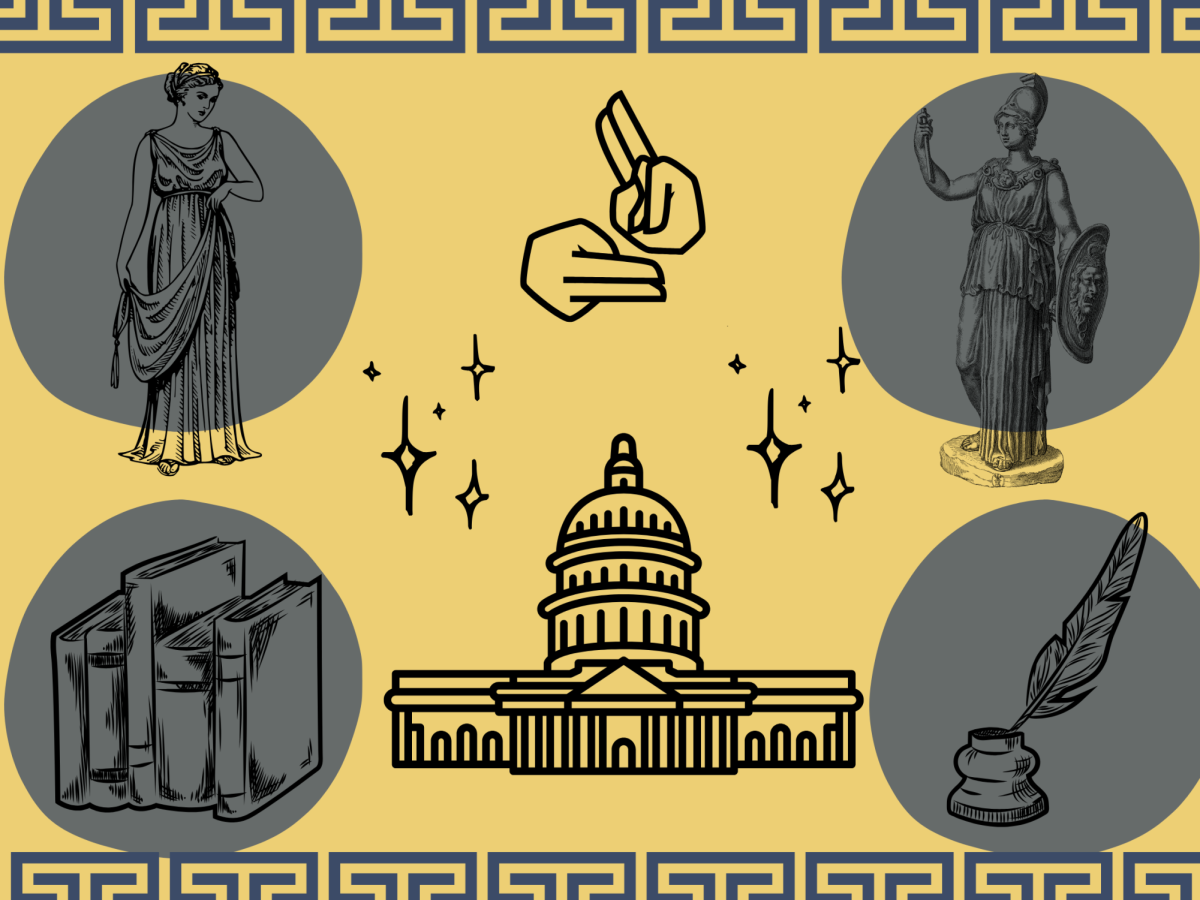In early 2024, tragedy struck the University of Georgia (UGA) campus in a way that caused a ripple effect of grief and resentment. As headlines began to share the unfortunate details of Laken Hope Riley’s passing, Georgia residents did not know how to cope with the gruesome death of a former UGA student. Recognized as a common stage of grief, people feel anger toward others, causing hurtful and offensive reactions. When UGA’s police department announced the arrest of 26-year-old Venezuelan immigrant Jose Antonio Ibarra for the murder of Riley, conservatives began connecting the tragic loss with immigration reform and hateful rhetoric.
During President Joe Biden’s State of the Union Address, former UGA student and Republican U.S. Representative Marjorie Taylor Greene appeared at the event with a MAGA hat and a Riley pin. Conservative writer Ryan James Girdusky compared Riley’s passing to the death of George Floyd, and Republican presidential candidate Donald J. Trump has mentioned Riley’s death at numerous rallies while accusing immigrants of poisoning the country. March 7, 2024, the Laken Riley Act passed the U.S. House with a vote of 251-170; this Act would require local law enforcement to check immigration status during encounters, and opponents to the bill claim that it will result in racial profiling. After the controversial bill passed, local police in Athens and other prominent Georgia cities reportedly set up checkpoints without specifying their location, meaning that undocumented immigrants could not drive without the possibility of detainment and deportation. Documented Latinos also face the risk of detainment; according to a 2018 University of Chicago study, Mexicans and Latino Americans face more suspicion from non-Hispanic whites of being undocumented than European and Asian immigrants. Riley’s passing has resulted in the reemergence of harmful rhetoric regarding immigrants, coincidentally during an election year.
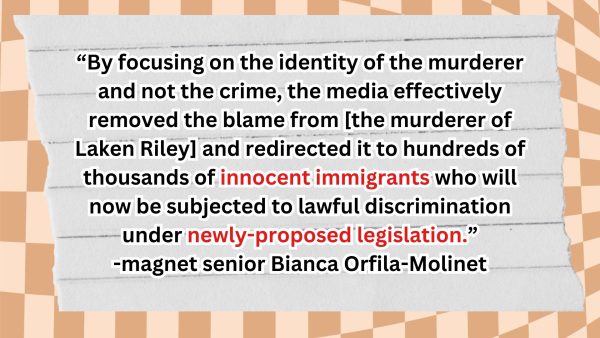
When discussing the importance of pawns in chess, experts claim that pawns affect the mobility of other pieces and that people typically target vulnerable and weak pawns. When referring to the game of U.S. politics, pawns refer to a person or group that remains controlled by powerful people. Ever since the U.S. earned its independence and sovereignty, politicians have vocalized their anti-immigrant perspectives with laws such as the Alien and Sedition Acts of 1798. During the late 1800s, immigrants from eastern and southern Europe came to America to escape poverty and religious intolerance. As immigrants with hopes and aspirations came to Ellis Island, anti-immigrant societies sprang up around the country and the Ku Klux Klan experienced an increase in membership. Nativism, a belief that prioritizes native-born citizens over immigrants, became a popular ideology during this period, and political parties appealed to the public by promising that they would crack down on immigration.
The U.S. faced the Great Depression during the 1920s, and numerous Americans blamed immigrants for taking jobs and compared immigrants to criminals and subhumans. Even though impoverished immigrants came to America for better opportunities, they faced racialist rhetoric and discriminatory laws from politicians. For example, The Immigration Act of 1924 limited the number of immigrants allowed entry into the U.S. and completely excluded immigrants from Asia.
Ever since the inception of this country, politicians have utilized fear-mongering tactics to boost their platforms and drive votes toward a specific political party. When the rise of communism resulted in Red Scares across America, politicians such as Republican Senator Joseph McCarthy attempted to expose suspected communists and communist sympathizers within society. During this time of hysteria, politicians began to antagonize Chinese immigrants as communists and enhanced their influence in communities across the country. As the Bracero program permitted Mexican citizens to take temporary work in the United States between 1942 and 1964, domestic workers accused Mexicans of taking jobs away from Americans. In reality, the program took advantage of undocumented workers by forcing them to work on farms and railroads to benefit the U.S. economy after World War II; a majority of undocumented workers worked for lower wages than their domestic counterparts.
The antagonization of immigrants with legal and undocumented status remains prevalent in America’s political climate, yet the faces of U.S. immigrants and dreamers have changed. Instead of Irish immigrants arriving on a boat to Ellis Island with the Statue of Liberty waiting for their arrival, more than 10,000 migrants and asylum seekers arrive at the U.S.-Mexico border daily. In 2021, nearly 40% of immigrants came to the country from Asia, followed by North America at 35%. As anti-immigrant rhetoric has ingrained itself into American culture for over 200 years, the false perceptions of immigrants as criminals and drug dealers have intertwined with U.S. politics. Instead of policymakers utilizing fear-mongering tactics about possible communists in society, conservative politicians typically frame undocumented people as illegal aliens as a way to dehumanize them.
“The anti-immigrant rhetoric in this country is nothing but political fuel to separate the American people more than it already is. By targeting a minority community that has little power to defend itself, politicians effectively create a one-sided hatred that then spreads through the constituencies they represent. In an effort to target an infinitesimal percentage of violent immigrants, they exclude the immigrants that are hardworking, resilient, courageous, and compassionate,” magnet senior Bianca Orfila-Molinet said.
People assumed that American society moved past the discriminatory beliefs of nativism, but similar ideas resurfaced in 2015 and 2016 with the help of Trump. From questioning President Barack Obama about his birthplace to advocating for the death penalty on the Central Park Five, Trump has gained notoriety for speaking with blunt transparency. With a net value of $4.5 billion in 2015, he strategically utilized charismatic leadership in the Republican Party that helped him advance to a presidential ticket. Even with his outlandish tweets about Mexico on Twitter and his memorable generalization of immigrants, he struck a chord with Republicans and he won the 2016 election against presidential candidate Hillary Clinton with nearly 63 million votes. Trump managed to become the king of the Republican Party while unearthing controversial sentiments about minorities, and numerous politicians have tried to follow in his footsteps ever since.
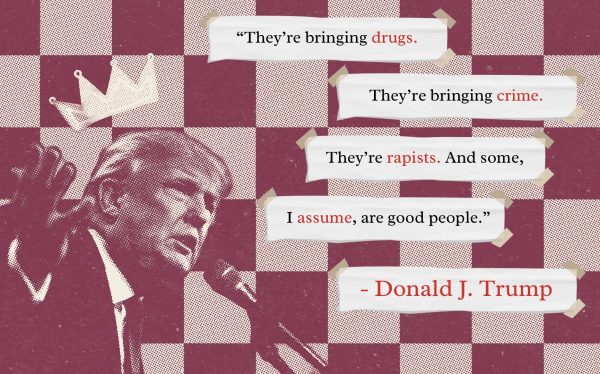
“I grew up in the country as an ‘illegal’ immigrant, a term that would go on to intertwine with my very being. I first heard this term in the fifth grade — when the 2016 elections were happening — after a classmate asked me if I was ‘illegal.’ I didn’t know how to answer the question, but I went home to ask my mom what the term meant. I had always known I wasn’t like the other kids who could go to Europe for spring break, but I had thought it was because we were broke. I never knew there was something ‘illegal’ about me and my family, having come from Mexico. The guilt I already felt by being brown was accentuated tenfold when I found out there was something ‘illegal’ about my existence. This mindset is a mental issue I am struggling with even now, even as a legal citizen of this country,” Marietta High School senior Esdras Nava said.
As politicians such as Marjorie Taylor Greene and Mike Johnson mimic the influential politics of Trump through their statements and attire, mainstream media outlets play a significant role in the game of U.S. politics. In news broadcasts such as Fox News, words such as illegals and illegal aliens frequently appear on their headlines. Various newspaper organizations also mislead their audiences about U.S. immigrants with manipulative headlines and exaggerated diction. To provide an example, Florida deputy Sgt. Michael Kunovich suffered a heart attack during an encounter with 19-year-old Guatemalan undocumented immigrant Virgilio Aguilar Mendez in May 2023. Aguilar Mendez faced a charge of aggravated manslaughter, yet Kunovich’s heart attack came as a result of pre-existing conditions meaning that Aguilar Mendez did not cause the death of the 52-year-old police officer; body camera footage later revealed that police officers pinned Aguilar Mendez to the ground and tased him on several occasions. When his charges were dropped in March 2024, the New York Post published an article about him and the headline labeled him as an illegal immigrant accused of killing a police officer.
“For as long as I can remember, me and my family have faced prejudice by people in the past due to my parents not understanding social norms in the United States. Many people in this country often overlook the motives for immigrants wanting to come to the country, and they are often ignorant of the fact that many immigrants want to start a new life in a better country. When some immigrants arrive here, they often struggle heavily to afford basic needs,” McEachern High School senior Brian Rodriguez said.
For activists and pro-immigrant advocates, labeling immigrants as aliens or illegals automatically criminalizes them as subhuman people. Politicians generalize the average American immigrant by comparing them to cartel members and drug smugglers, when in reality around 77% of drug traffickers in America identify as legal U.S. citizens. Ever since the late 20th century, Americans believed that immigration waves resulted in increased crime. In reality, researchers at the CATO Institute discovered that undocumented immigrants remain 37.1% less likely to face a criminal conviction. U.S. immigrants help improve the mobility of this country by paying taxes and raising the productivity of U.S. businesses. According to the Pew Research Center, 36.5 million lawful immigrants resided in America and unauthorized immigrants represented 3% of the U.S. population in 2021.
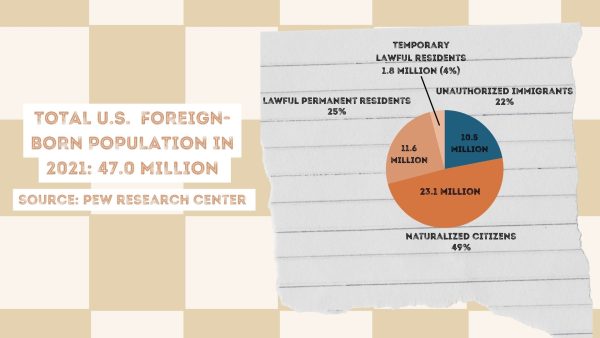
Undocumented people face numerous challenges when it comes to receiving legal citizenship; if an immigrant enters the U.S. without legal admission and inspection, America generally prohibits them from accessing green cards. Annually, the U.S sets a numerical limit on the amount of refugees that will receive legal status for humanitarian reasons, and the process to receive a visa could take years due to long backlogs and waits. The Obama administration introduced the Deferred Action for Childhood Arrivals (DACA) policy, allowing young unauthorized immigrants to remain in the country with temporary lawful status. September 5, 2017, the Trump administration officially announced that they would rescind DACA, and due to numerous immigration bans implemented by the Trump administration and slow processing by the Biden administration, undocumented immigrants struggle with garnering citizenship and they become easy targets in U.S. politics.
As U.S. immigrants face attacks from politicians and nativists, their children also face the repercussions of anti-immigrant rhetoric. Nearly 5,000 foreign-born people lived in Kennesaw, GA, in 2021, and NC celebrates students from diverse households with the “Warriors of the World” program. However, Riley’s death ignited discussions of immigration reform rather than advocating for an end to femicide. With the possibility of various checkpoints and xenophobia throughout Georgia, Latino communities feel extremely conflicted. If children of unauthorized immigrants experienced traumatic separations from their parents at these strategic checkpoints, it could result in permanent psychological and physical changes. At a time when prominent politicians preach nativist rhetoric, children of immigrants and young advocates come together to address the flaws of using Riley’s death to push a political agenda. When referring to a game of chess, pawns on an individual scale remain weak and fragile; however, when pawns are grouped, they create a force that matches the queen’s strength. As UGA-based organizations such as Movimiento Latino and the Hispanic Student Association combat hateful rhetoric, their student-led leadership helps remind American society about the importance of humanizing U.S. immigrants.
“Movimiento Latino, with its emphasis on empowerment and activism, fosters a spirit of unity and collective action, empowering individuals to advocate for social justice and equality. In times of hardship and division, solidarity within Hispanic communities and among first-generation and second-generation students serves as a powerful force for positive change. These communities offer a sense of belonging, understanding, and shared experience that can help individuals navigate adversity and combat discrimination,” UGA Assistant Dean for Undergraduate Diversity, Equity, and Inclusion (DEI) Sonia Garcia said.












